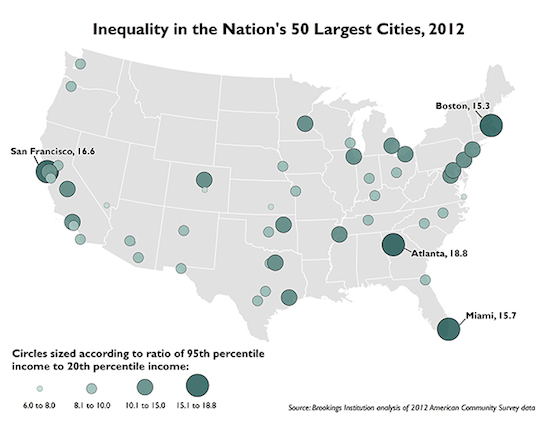San Francisco has the second highest gap between the rich and the poor in the United States, according to a new study from the Brookings Institution released today.
The study looked at US Census data across different income levels and ranked cities for not only the widening chasm between the rich and the poor, but also the speed at which that gap increased. Though San Francisco has the second widest income inequality gap (second to Atlanta, where the poor are poorer, but the rich far less rich than here), it’s tops in terms of the speed at which the wealthy are pulling away from the rest of us, the study found.
“Not surprisingly, San Francisco experienced the largest increase in its ratio from 2007 to 2012,” the Brookings Institution reported. “Income for its typical 20th-percentile household dropped $4,000 during that period, while income for its typical 95th-percentile household soared by $28,000. No other city saw nearly as large an increase in its rich households’ incomes.”

San Francisco was second place for highest inequality, but tops in terms of speed at which the income gap widened.
San Francisco differed from other cities in the unique nature of its inequality as well — for the most part, we’re unequal because our rich got richer, while other cities’ poor got poorer. “San Francisco’s ratio is high because its wealthy households have very high incomes, considerably higher than in any other major city ($353,000 at the 95th percentile),” Brookings Institution reported. And as anyone who’s looked for an apartment in San Francisco has seen, the poor and middle class are also getting pushed out of the city, which the study also noted.
One of the most depressing flyer on San Francisco housing you’ll see. pic.twitter.com/1uTm9BLodZ
— Joe Fitz Rodriguez (@FitzTheReporter) February 19, 2014
So why is all this such a problem? Can’t everyone just move to Oakland? The study also noted the problems inherent in a city with a wide income gap.
“A city where the rich are very rich, and the poor very poor, is likely to face many difficulties,” the Brookings Institution noted. “It may struggle to maintain mixed-income school environments that produce better outcomes for low-income kids. It may have too narrow a tax base from which to sustainably raise the revenues necessary for essential city services. And it may fail to produce housing and neighborhoods accessible to middle-class workers and families, so that those who move up or down the income ladder ultimately have no choice but to move out.”
These are problems the city knows all too well. As the San Francisco Public Press reported recently, our public school system is increasingly divided between haves and have-nots, and as the Guardian reported only this week, our infrastructure funding is lacking by billions of dollars. And of course, as our families flee the city, San Francisco loses its children in droves, which US Census data has also highlighted.
Read the full report from on San Francisco’s widening income gap here.

